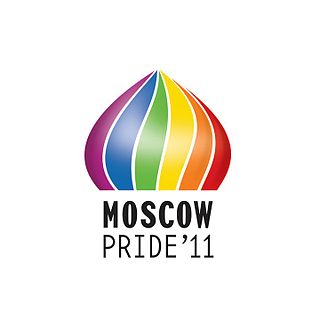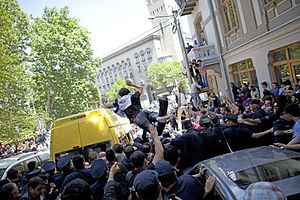Lesbian, gay, bisexual, transgender, queer, intersex, and asexual (LGBTQIA+) people frequently experience violence directed toward their sexuality, gender identity, or gender expression. This violence may be enacted by the state, as in laws prescribing punishment for homosexual acts, or by individuals. It may be psychological or physical and motivated by biphobia, gayphobia, homophobia, lesbophobia, and transphobia. Influencing factors may be cultural, religious, or political mores and biases.
Freedom of religions in Georgia is provided for by the country's constitution, laws, and policies. In practice, the Georgian government generally respects religious freedom; however, the Georgian Orthodox Church enjoys a privileged status in terms of legal and tax matters, involvement in public schools, and property disputes. There have been efforts by private citizens, local government officials, and local Georgian Orthodox Church leaders to harass and persecute members of minority religious groups and interfere with their worship activities; despite calls for tolerance and respect for pluralism by government leaders, the Georgian central government has not been successful in preventing such incidents.

Ilia II, also transcribed as Ilya or Elijah, is the Catholicos-Patriarch of All Georgia, the spiritual leader of the Georgian Orthodox Church. He is officially styled as "Catholicos-Patriarch of All Georgia, the Archbishop of Mtskheta-Tbilisi and Metropolitan Bishop of Bichvinta and Tskhum-Abkhazia, His Holiness and Beatitude Ilia II."

Lesbian, gay, bisexual, and transgender (LGBT) people in Serbia face legal challenges not experienced by non-LGBT residents. Both male and female same-sex sexual activity are legal in Serbia, and discrimination on the basis of sexual orientation is banned in areas such as employment, education, media, and the provision of goods and services, amongst others. Nevertheless, households headed by same-sex couples are not eligible for the same legal protections available to opposite-sex couples.

Lesbian, gay, bisexual, and transgender (LGBT) people in Ukraine face legal and social challenges not experienced by non-LGBT individuals; historically, the prevailing social and political attitudes have been intolerant of LGBT people, and strong evidence suggests this attitude remains in parts of the wider society. Since the fall of the Soviet Union and Ukraine's independence in 1991, the Ukrainian LGBT community has gradually become more visible and more organized politically, organizing several LGBT events in Kyiv, Odesa, Kharkiv, and Kryvyi Rih.

Lesbian, gay, bisexual, and transgender (LGBT) persons in Romania may face legal challenges and discrimination not experienced by non-LGBT residents. Attitudes in Romania are generally conservative, with regard to the rights of gay, lesbian, bisexual, and transgender citizens. Nevertheless, the country has made significant changes in LGBT rights legislation since 2000. In the past two decades, it fully decriminalised homosexuality, introduced and enforced wide-ranging anti-discrimination laws, equalised the age of consent and introduced laws against homophobic hate crimes. Furthermore, LGBT communities have become more visible in recent years, as a result of events such as Bucharest's annual pride parade and Cluj-Napoca's Gay Film Nights festival.

Lesbian, gay, bisexual, and transgender (LGBT) rights in Cyprus have evolved in recent years, but LGBT people still face legal challenges not experienced by non-LGBT residents. Both male and female expressions of same-sex sexual activity were decriminalised in 1998, and civil unions which grant several of the rights and benefits of marriage have been legal since December 2015. Conversion therapy was banned in Cyprus in May 2023. However, adoption rights in Cyprus are reserved for heterosexual couples only.

Homophobia encompasses a range of negative attitudes and feelings toward homosexuality or people who identify or are perceived as being lesbian, gay or bisexual. It has been defined as contempt, prejudice, aversion, hatred or antipathy, may be based on irrational fear and may sometimes be attributed to religious beliefs.

Human rights in Georgia are guaranteed by the country's constitution. There is an independent human rights Public Defender of Georgia elected by the parliament to ensure such rights are enforced. However, it has been alleged by Amnesty International, Human Rights Watch, the United States Department of State and the Georgian opposition that these rights are often breached.

Lesbian, gay, bisexual and transgender (LGBT) people in Georgia face significant challenges not experienced by non-LGBT residents. Georgia is one of the few post-Soviet states that directly prohibits discrimination against all LGBT people in legislation, labor-related or otherwise. Since 2012, Georgian law has considered crimes committed on the grounds of one's sexual orientation or gender identity an aggravating factor in prosecution. The legislative ban on discrimination has been enacted as a part of the Government efforts to bring the country closer to the European Union and make the country's human rights record in line with the demands of Georgia's European and Euro-Atlantic integration.

Lesbian, gay, bisexual, and transgender (LGBT) people in Moldova face legal and social challenges and discrimination not experienced by non-LGBT residents. Households headed by same-sex couples are not eligible for the same rights and benefits as households headed by opposite-sex couples. Same-sex unions are not recognized in the country, so consequently same-sex couples have little to no legal protection. Nevertheless, Moldova bans discrimination based on sexual orientation in the workplace, and same-sex sexual activity has been legal since 1995.

Moscow Pride is a demonstration of lesbians, gays, bisexuals, and transgender persons (LGBT). It was intended to take place in May annually since 2006 in the Russian capital Moscow, but has been regularly banned by Moscow City Hall, headed by Mayor Yuri Luzhkov until 2010. The demonstrations in 2006, 2007, and 2008 were all accompanied by homophobic attacks, which was avoided in 2009 by moving the site of the demonstration at the last minute. The organizers of all of the demonstrations were Nikolai Alekseev and the Russian LGBT Human Rights Project Gayrussia.ru. In June 2012, Moscow courts enacted a hundred-year ban on gay pride parades. The European Court of Human Rights has repeatedly ruled that such bans violate freedom of assembly guaranteed by the European Convention of Human Rights.

Lesbian, gay, bisexual, and transgender (LGBT) people in Kyrgyzstan face significant challenges not experienced by non-LGBT residents. Both male and female same-sex sexual activities are legal in Kyrgyzstan, but same-sex couples and households headed by same-sex couples are ineligible for the same legal protections available to opposite-sex married couples.

The history of lesbian, gay, bisexual and transgender people (LGBT) in Russia and its historical antecedents has largely been influenced by the political leanings of its rulers. Medieval Catholic-Protestant Europe had the largest influence on Russian attitude towards homosexuality. Russian LGBT history was influenced by the ambivalent attitude of the Russian Orthodox religiosity regarding sexuality.
In 2013, Georgia finalized its first-ever peaceful change of power and transition to a parliamentary republic. The Georgian Dream-dominated government, which came to power after defeating, in October 2012, the United National Movement led by the outgoing President Mikheil Saakashvili, promised more democratic reforms. The Georgian Dream candidate Giorgi Margvelashvili won the presidential election in October 2013 and the new constitution significantly reducing the authority of the president in favor of those of the prime minister and government came into effect. In November, the leader of the Georgian Dream, Prime Minister Bidzina Ivanishvili announced his withdrawal from politics as promised earlier, and the Parliament of Georgia approved his nominee, Irakli Garibashvili, as the country's new head of government.
During the lead-up to the 2014 Winter Olympics, protests and campaigns arose surrounding the rights of lesbian, gay, bisexual, and transgender (LGBT) people in Russia.
Homosexuality in Serbia was first criminalised from 1860 through various regimes, until its first decriminalization in the Socialist Autonomous Province of Vojvodina in 1977. When Vojvodina was reintroduced fully into the Republic of Serbia legal system during the breakout of Yugoslavia, it was recriminalised again, until 1994, when it was decriminalised in the entire Serbia.

For the Purpose of Protecting Children from Information Advocating a Denial of Traditional Family Values, commonly known as the Russian anti-LGBT law or as the Russian anti-gay law, is a law of Russia. It was unanimously passed by the State Duma on 11 June 2013, unanimously passed by the Federation Council on 27 June 2013, and signed into law by President Vladimir Putin on 30 June 2013.

The 2021 attack on Tbilisi Pride was a violent counter-demonstration by far-right protesters against an attempt to hold a pride parade by pro-LGBT organizers of the NGO Tbilisi Pride in Tbilisi, Georgia. Anti-LGBT protesters frustrated attempts to hold a parade, attacked dozens of journalists who were covering the events and NGO offices, which resulted in the canceling of the Pride demonstration after four location changes from the initial procession at Rustaveli Avenue.
Tbilisi Pride is an annual LGBT week-long event and Pride parade held since 2019 in Tbilisi, Georgia. The event has faced multiple threats and counter protests since its inception, most notably in 2021 and 2023.














